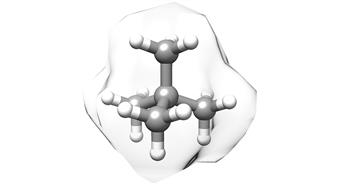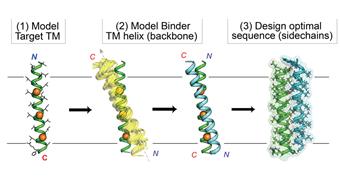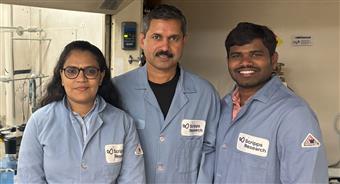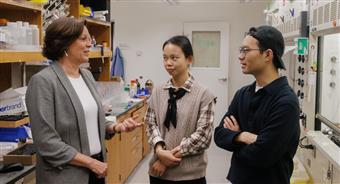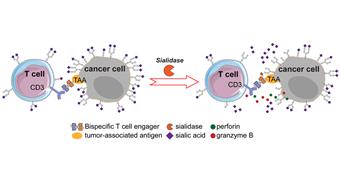
New technique improves T cell-based immunotherapies for solid tumors Scripps Research scientists help T cells more effectively kill solid tumors cells in vitro and in mice by tweaking an existing cancer immunotherapy.
May 01, 2024
LA JOLLA, CA Scientists from Scripps Research have enhanced an existing immunotherapy by removing the sugar coating surrounding solid tumors such as in melanoma, breast, and prostate cancer so T cells can more effectively kill tumor cells. They report in the journal Nature Biomedical Engineering on May 1, 2024, that this tweak allows T cells to get closer to their targets, which dramatically improves T-cell killing of tumor cells in mouse models.
Compared to blood tumors, solid tumors are resistant to treatment because they build a physical fort around themselves to block immune cells from entering and attacking. Part of this fort is made up of layers of sugar molecules, the outermost of which is a substance called sialic acid. To remove this sialic acid barrier, the research team fused the enzyme sialidase onto cancer therapy agents called bispecific T-cell engager (BiTE) molecules. These molecules typically work by activating a patient's own T cells against the cancer.
Solid tumors form a microenvironment around themselves that is immunosuppressive, says senior author Peng Wu, PhD, a professor in the Department of Molecular Medicine at Scripps Research. Immune cells have to enter this solid mass which is covered with sialic acid molecules that physically block T cells from infiltrating. The idea here is to introduce sialidase to the T-cell engager to chop off sialic acid from the outside of the tumor mass so that T cells have a better chance to enter.
BiTE molecules have two binding sites one that binds to molecules on tumor cell surfaces called antigens, and one that binds to the T-cell receptor complex. Several BiTE therapies are already FDA-approved, but they all target blood cancers (such as blinatumomab, which targets B-cell leukemia). However, clinical trials against solid tumors, which make up 90% of tumors, have had limited success.
All of the approved drugs for T-cell engager molecules are against blood tumors, because all of the BiTE clinical trials against solid tumors have been pretty underwhelming, says first author Zhuo Yang, PhD, who recently completed his PhD at Scripps Research under the guidance of Wu and the late Richard Lerner, MD. Were really hoping the strategy that we present here may have the potential to make a breakthrough for T-cell engaging therapies against solid tumors.
The researchers tested the fusion of sialidase to several different BiTE molecules targeting different types of cancer, including antigens associated with breast, B-cell and prostate cancers. In all cases, the addition of sialidase to create these fusion molecules improved T-cell killing in a lab dish (in vitro). In collaboration with Rutgers University, the research used fluorescent microscopy to show that these fusion molecules resulted in a much larger contact area (or immunological synapse ) between T cells and the tumor cells that enables better tumor killing.
Next, the researchers tested the fusion molecule's efficacy at treating solid tumors in mice. They found that mice that were treated with the fusion molecule had delayed tumor growth, smaller tumors, and were more likely to survive compared to mice treated with regular BiTE molecules. In one of the cancer models, treatment with the fusion molecule completely eradicated the tumors for two out of five mice.
The researchers also observed an altered microenvironment surrounding the tumor, which they credit with these improved treatment outcomes. In the presence of the fusion molecule, we have better infiltration of T cells and natural killer cells, which are good cells for killing tumors, and less accumulation of immunosuppressive cells, says Wu. So basically, the fusion molecule can convert an immunosuppressive tumor microenvironment into a more immune-permissive one.
Though the team hypothesized that adding sialidase would improve T-cell engagement, they were surprised by how much of a difference it made. By simply cutting off one single sugar thats overexpressed on the surface of tumor cells, we can have huge enhancements, says Yang. There are many sugars on the surface of tumor cells and we're only getting rid of the first layer, so we were not expecting to see such dramatic effects.
Eventually, the researchers hope that their technology will help treat human cancer patients, but first they will need to engineer the molecules to make them more suitable for humans. They also hope to inspire more cancer researchers to consider sugars when designing therapeutics.
Tumor cells have unique sugar patterns, but people rarely consider them, says Wu. Were hoping that in the future more and more people will think about sugars when they are designing therapeutic strategies.
In addition to Wu and Yang, authors of the study, Targeted desialylation and cytolysis of tumour cells by fusing a sialidase to a bispecific T-cell engager, include Yingqin Hou, Geramie Grande, Chao Wang, Yujie Shi, Jaroslav Zak, Yue Wan, Ke Qin, John R. Teijaro, and the late Richard A. Lerner of Scripps Research; and Jong Hyun Cho and Dongfang Liu of Rutgers University-New Jersey Medical School.
This work was supported by the NIH and a Cancer Research Institute/Irvington postdoctoral fellowship.
Cancer Wu, Peng
More from Scripps
17/05/2024
Scripps Research chemist Donna Blackmond elected to the Royal Society of the U.K. Blackmond's wide-ranging work has shaped origin of life theories, our unde...
08/05/2024
Professor emeritus John (Jack) Johnson elected to the National Academy of Sciences Johnson's multi-disciplinary research has been instrumental in shaping ou...
03/05/2024
TIME100 Health list features Scripps Research Executive Vice President Eric Topol New list honors 100 individuals who most influenced global health in 2024.
M...
02/05/2024
New technique improves T cell-based immunotherapies for solid tumors Scripps Research scientists help T cells more effectively kill solid tumors cells in vitro ...
20/04/2024
New copper-catalyzed C-H activation strategy from Scripps Research Two-mode reactions inspired by human detox enzymes offer powerful new tools for drug discover...
12/04/2024
Scripps Research chemists devise easier new method for making a common type of building block for drugs Scientists transform simple linear amines into saturated...
06/04/2024
A simple, inexpensive way to make carbon atoms bind together A Scripps Research team uncovers a cost-effective method for producing quaternary carbon molecules,...
04/04/2024
Developing a vaccine for the zombie drug xylazine Scripps Research chemical biologists design an early proof-of-concept vaccine that could lead to the first...
30/03/2024
How blocking a neural receptor responsible for addiction could reduce alcohol use A Scripps Research team found that a new therapeutic that targets the kappa op...
13/03/2024
New computational strategy boosts the ability of drug designers to target proteins inside the membrane Customized-design approach could streamline the design of...
29/02/2024
Scripps Research scientists reveal how first cells could have formed on Earth New phospholipid discovery brings researchers closer to understanding how primordi...
29/02/2024
How molecular handedness emerged in early biology Scripps Research chemists fill a major gap in origin-of-life theories.
February 28, 2024
LA JOLLA, CA Mole...
22/02/2024
Snaking toward a universal antivenom Scripps Research scientists discovered antibodies that protect against a host of lethal snake venoms.
February 21, 2024
...
06/02/2024
Calibr-Skaggs announces expansion of option and license agreement with AbbVie to develop novel cell therapies for solid tumors and autoimmune diseases
AbbVie...
26/01/2024
Re-energizing mitochondria to treat Alzheimer's disease Scripps Research team restored neuron-to-neuron connections in human cells.
January 25, 2024
LA JO...
24/01/2024
100 years of Science Changing Life: Scripps Research celebrates a century of transforming human health For the last century, institute leaders and renowned scie...
23/01/2024
New technology lets researchers track brain cells' off switches The method could shed light on what goes awry in numerous brain conditions when neurons ar...
09/01/2024
Three decades of giving: Announcing the Calibr-Skaggs Institute for Innovative Medicines The ALSAM Foundation, founded by the Skaggs family, provides lasting g...
04/01/2024
Life science entrepreneur Gene Lay joins Scripps Research Board of Directors Lay, founder of the global biotech company BioLegend, brings invaluable experience ...
21/12/2023
Taming a plant-derived toxin Scripps Research team modifies the traditional poison picrotoxinin for potential neurological drugs and anti-parasite treatments. ...
19/12/2023
Scripps Research Executive Vice President Eric Topol gives TED talk on transformative power of AI in medicine Topol provides an overview of how AI models can i...
13/12/2023
New AI-powered algorithm could better assess people's risk of common heart condition Early detection of atrial fibrillation can reduce the risk of stroke an...
07/12/2023
Nanoparticle flu vaccine design shows promise in early tests Scripps Research-designed vaccine could provide broad, enduring protection against influenza A str...
16/11/2023
Numerous Scripps Research scientists named Highly Cited Researchers Clarivate's annual, global list represents researchers who have demonstrated significant...
07/11/2023
Multiple sclerosis drug invented at Scripps Research slows long-term devastating disease progression Late-breaking data reinforces the effectiveness and safety ...
05/10/2023
Keren Lasker named a 2023 Moore Inventor Fellow The prestigious award will support Lasker's inventive research in membraneless organelles and their applica...
22/09/2023
Michael Bollong named a 2023 Amgen Young Investigator The prestigious award will support Bollong's research identifying new molecular targets and therapeuti...
09/09/2023
Philip Dawson receives 2024 American Chemical Society National Award Dawson is honored with the Arthur C. Cope Late Careers Scholar Award for his foundational c...
07/09/2023
Scripps Research chemists devise a method for C-H activation of alcohols The method represents a new toolkit for making drugs and other compounds.
September 06...
31/08/2023
Scripps Research receives $1.5M to surveil infectious disease threats in wastewater Bill & Melinda Gates Foundation award to support the development of multi-pa...
16/08/2023
How cold temperatures trigger the brain to boost appetite Scripps Research scientists' discovery could lead to new weight loss and metabolic health treatmen...
08/08/2023
Human antibody that targets carfentanil, fentanyl and related opioids reverses overdose effects in preclinical study Scripps Research-developed antibody therapy...
04/08/2023
How sensory neurons impact the gut Scripps Research scientists show that the receptor PIEZO2 in sensory neurons controls gut motility and transit time, which a...
26/07/2023
AbbVie and Calibr Expand Strategic Collaboration to Advance Several Preclinical and Early-stage Clinical Assets The expanded strategic collaboration will advan...
23/07/2023
Scripps Research scientists develop AI-based tracking and early-warning system for viral pandemics Machine-learning system effectively predicts emergence of pro...
19/07/2023
Monitoring T cells may allow prevention of type 1 diabetes Scripps Research study shows that analyzing T cells in blood samples could be used to select at-risk ...
19/07/2023
Scripps Research mourns passing of leading organic chemist Albert Eschenmoser Eschenmoser pioneered key reactions in synthetic chemistry and shaped the understa...
15/06/2023
Scripps Research awarded $46.8 million by NIH to promote human health through innovative translational science and training The Translational Institute is harne...
13/06/2023
Scripps Research's Danielle Grotjahn named 2023 Pew Scholar in the Biomedical Sciences The award will support Grotjahn's study of how cells assemble the...
31/05/2023
Crossing the ring: new method enables C-H activation across saturated carbocycles Scripps Research chemists add another powerful tool to their molecular editin...
24/05/2023
Scripps Research develops behind-the-scenes tool for better biomedical data discovery The new resource makes datasets more discoverable for life science communi...
19/05/2023
Scripps Research neuroscientist Hollis Cline elected to American Academy of Arts and Sciences Cline is recognized for her discoveries about the role of sensory ...
19/05/2023
Scripps Research's Skaggs Graduate School awards doctoral degrees to 31st graduating class Commencement ceremony will be livestreamed via Zoom and on instit...
13/05/2023
A better route to benzocyclobutenes, sought-after building blocks for drugs Scripps Research chemists devise a new, C-H activation-based method for the synthesi...
09/05/2023
Renowned Scripps Research professor Jeffery Kelly elected to National Academy of Sciences Kelly's groundbreaking work on protein misfolding has led to thera...
28/04/2023
Mirror-image molecules pave new path for cancer drug discovery By comparing how mirror image versions of small molecules impact clusters of proteins, Scripps R...
22/04/2023
How alcohol consumption contributes to chronic pain A Scripps Research team showed how both alcohol intake and alcohol withdrawal can lead to increased pain and...
21/04/2023
Xin Jin receives dual awards to study autism risk genes in neurodevelopment Major grants from the National Institutes of Health and California Institute for Reg...
20/04/2023
Trim the sugar: New HIV vaccine design improves immune response Scripps Research vaccine candidate headed for clinical trials.
April 19, 2023
LA JOLLA, CA A...
18/04/2023
Therapeutic can seek and destroy potent opioid to treat overdoses Scripps Research chemists developed a new biologic to work against the synthetic opioid carfen...
 New technique improves T cell-based immunotherapies for solid tumors Scripps Research scientists help T cells more effectively kill solid tumors cells in vitro and in mice by tweaking an existing cancer immunotherapy.
New technique improves T cell-based immunotherapies for solid tumors Scripps Research scientists help T cells more effectively kill solid tumors cells in vitro and in mice by tweaking an existing cancer immunotherapy.


















